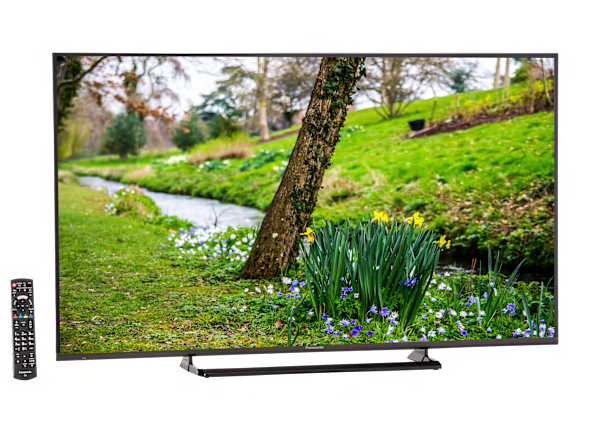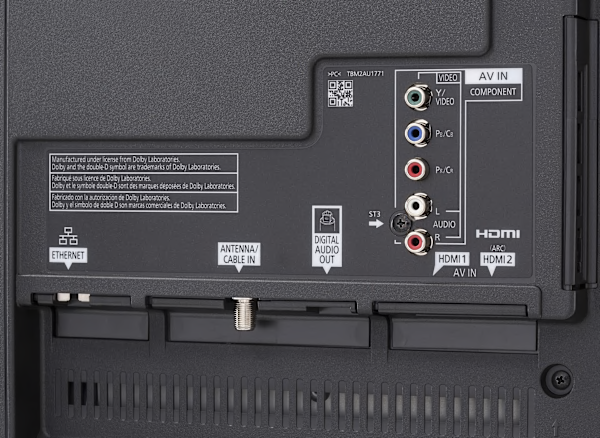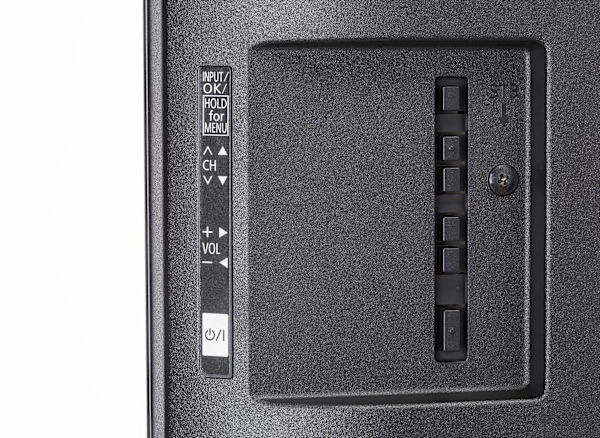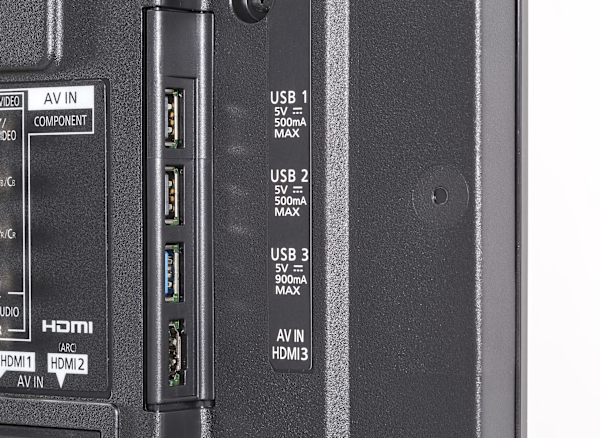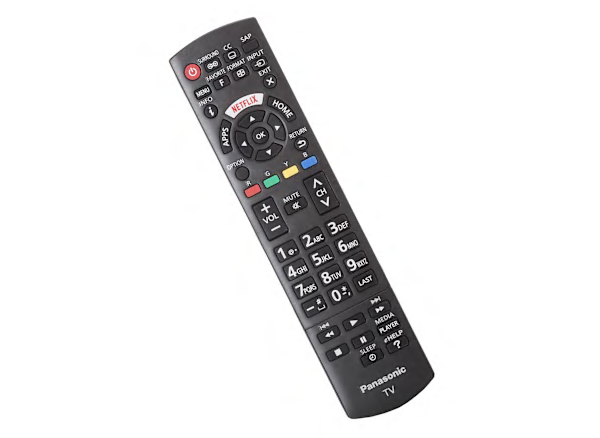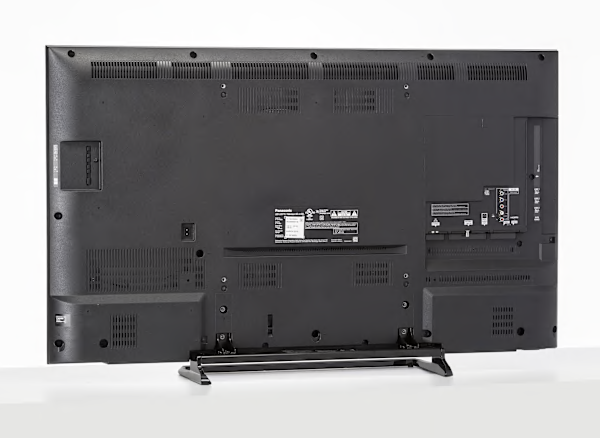PICTURE QUALITY This model had excellent high-definition picture quality. It did an excellent job displaying the finest detail. Color accuracy was very good, with images generally looking natural. Contrast--the difference between the darkest blacks and brightest whites--was good, so images had depth and dimension, typical of most models we test. The brightness level was good, making it a suitable choice for most rooms. Black levels are very good delivering fairly deep blacks due to Panasonic's effective "Adaptive backlight control," a local dimming feature designed to give greater depth and contrast to dark scenes. Any unwanted illumination side effects often introduced by such a feature were minimal so we left the feature on. Avoid setting the feature to "maximum" as it induces some unwanted image processing effect that blows out shadow nuances on highlights, particularly visible on faces in darker scenes. (see "viewing angle" comments for other limitations on black level quality.) Images had an excellent level of detail without any enhancement. In scenes with subtly shaded light-to-dark areas, such as a sky during sunset, the TV did a very good job producing a smooth transition without distinct, coarse bands. The deinterlacing and film mode operations were excellent on HD content; there was little or no trace of jaggies on the edges of objects for video and film-based 1080i video content, such as from cable.
VIEWING ANGLE This Panasonic has a wide viewing angle overall, better than that of most LCDs. It will provide the same picture quality, with fewer problems than most LCD sets, for typical viewing conditions--say, if your family is seated across a long sectional or in chairs off to the sides of the TV.
When we moved off to the sides the horizontal viewing angle was very good; the picture showed a slight loss of color so flesh tones looked a bit washed out, along with a slight color shift. Black levels brightened significantly, making dark scenes look hazy.
ULTRA HD PERFORMANCE This Panasonic UHD TV delivers full 4K picture detail, along with very good HD-to-UHD upconversion. All native 4K content we played on this model, including movies and test videos from our Sony FMPX10 player, was presented in full detail with excellent image fidelity when played back via the TV's HDMI input. This model also supports video streaming of 4K programs via both Netflix and YouTube (among other emerging sources), and again, images were clean and finely detailed with no visible over-sharpening or other gratuitous processing. Using the TV's USB port, we were able to play back 4K videos stored on a flash drive which were encoded in both the HEVC and VP9 formats, as well as MP4. High-resolution photos were displayed in full 4K detail, and like the videos, revealed great clarity, taking full advantage of UHD's extra resolution. With regular HD content, the TV's HD-to-UHD up-conversion processing was very good, with edges along diagonals of image content showing very slight jaggies, just short of the best we've seen. All three of the TV's HDMI inputs comply with the latest HDMI 2.0 and HDCP 2.2 specifications that support play back for 4K video at 60Hz, and copy protection, a requirement for compatibility with emerging 4K movie play back devices such as a 4K Blu-ray player.
MOTION BLUR This Panasonic TV has only fair motion performance, with significant blurring on our motion tests. Though this model includes Motion picture setting, a feature designed to reduce motion blur, we found it was ineffective. On typical program content, the blurring effect is often fleeting and may not bother most people. However, keen-eyed viewers may detect the loss of texture and detail on scenes with movement, especially in high-quality video such as a Blu-ray movie.
SCREEN REFLECTIVITY Though not as mirror-like as on some LCDs, this screen surface is glossy and therefore susceptible to reflections from a nearby lamp or window. The screen is dark so it does a good job reducing glare from ambient light and maintains contrast even in a bright room.
SOUND QUALITY This TV has good sound quality; about average among the TVs we've tested. When watching a movie blockbuster, a concert, or TV show, it delivers decent performance but falls short of the better performers. With movies, dialog was generally clear and natural sounding, though a bit muffled, and remained well balanced with respect to background music and other sounds. Base extension was lacking, but treble was nicely detailed, while the overall sound was on the bright side, and a bit closed in. It has a good volume range, though sound quality degrades at the highest settings. Most will find this sound quality acceptable.
EASE OF USE Overall, we found the set easy to use. Setting up the TV for the first time was very easy, as was access to features and controls you'll probably adjust only once. Ease of access to features you typically use more often was very good. Also, the remote is very good, and the on-screen menu is very easy to navigate.
The remote's major function buttons were sufficiently large and have high-contrast labeling, making them easier to see and navigate.
STAND ASSEMBLY Mounting the support stand to the TV is fairly straightforward, requiring the assembly of a few parts before mounting.
INTERNET FEATURES This TV provides advanced Internet capability. Features include access to a library of applications via "Viera Market and a full Web browser.
CONNECTIONS This TV includes three HDMI inputs, one shared connection between the component and composite inputs (which means you can only use one type or the other at a time), optical digital audio out, three USB ports, an Ethernet port, and Wi-Fi. Wireless connectivity includes: DLNA network file sharing. HDMI and analog cable connections made to the rear-facing panel will protrude beyond the panel's slim depth.
INCLUDED IN THE BOX The TV comes with: a printed user manual, an electronic manual in the TV's menu, a quick start guide, and a remote with batteries. ABOUT FIRMWARE VERSION: Our test results and picture settings are valid for the version of firmware indicated. If your TV's firmware differs from the one shown you either have an older or a newer version of firmware. Manufacturers may periodically upgrade the TV's firmware to enhance operation, fix bugs, or add features. Firmware upgrades may be downloadable directly to your TV via a wired or wireless network (if internet capable), USB port, or memory card, depending on your TV's capability. You can check your TV's firmware version, or upgrade to the latest firmware by pressing the menu button on your remote and navigating to the appropriate submenu, typically under settings. Consult the user manual or manufacturer's website if further guidance is needed.

















